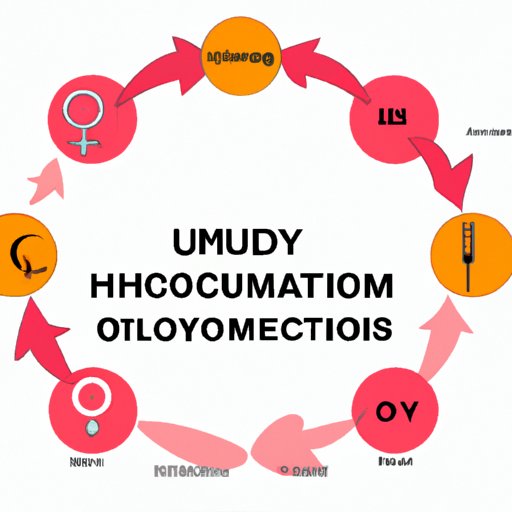
Introduction
Ovulation, the process by which the ovaries release an egg each month, is a natural occurrence for women of reproductive age. At the same time, sexual desire, or libido, is an integral part of human sexuality, and involves a range of physical, emotional, and psychological factors. But is there a link between ovulation and sexual desire? Does ovulation make you horny? In this article, we will explore the science behind the connection between ovulation and libido, including the effects of hormones, psychology and other factors that can influence sexual desire.
Understanding the Link Between Ovulation and Libido
Ovulation can have a significant effect on a woman’s hormone levels and, in turn, on her libido. During ovulation, the level of estrogen in the body rises sharply and, at the same time, testosterone levels also increase. These hormonal fluctuations can boost sexual desire and urge.
However, it’s not just hormones that determine sexual desire. Psychological factors such as stress, anxiety, and emotional states can also impact libido. With this in mind, scientists have studied the impact of ovulation on a woman’s mood and emotional states, as well as her sexual attractiveness, to better understand the relationship between ovulation and libido.
The Science Behind Why Ovulation Can Increase Sexual Desire
Several scientific studies have attempted to uncover the reasons why ovulation may increase sexual desire. Among the factors that have been suggested are the effects of estrogen on the brain and the instinctive drive to procreate.
One theory is that the rapid surge in estrogen during ovulation triggers the release of the neurotransmitter dopamine, which is associated with pleasure and reward. This can lead to an increased desire for sex, as well as feelings of attraction and euphoria, especially towards a potential partner or romantic interest.
Another theory is that ovulation is a sign of fertility, and that women are instinctively more driven to procreate during this time. This drive has been attributed to the innate biological urge to ensure the survival of the species, and may explain why women seem to be naturally more interested in sex during ovulation, even without consciously knowing that it is happening.
How Tracking Your Menstrual Cycle Can Boost Your Sex Life
Tracking your menstrual cycle can have many benefits for your overall sexual health and well-being. By understanding your fertility window – the period when you are most likely to conceive – you can time sex to increase the likelihood of getting pregnant if that’s what you’re aiming for.
However, tracking your menstrual cycle can also help you and your partner enhance your intimacy and communication. By knowing when your fertility peaks, you can plan romantic activities and boost your libido during the most fertile days of your menstrual cycle. You can also use these days as a useful reminder to take time for your sexual health and to prioritize your self-care during this time.
The Surprising Ways Ovulation Affects Your Body and Mind
Ovulation can affect you in many different ways, beyond your sexual desires. For example, recent studies have shown that ovulation can lead to physical changes in a woman’s appearance, such as an increase in waist-to-hip ratio and fuller lips.
There are also changes in mood and emotional state. Many women report experiencing mood swings, heightened emotional sensitivity and irritability during ovulation. However, some women feel energized and more motivated during this time, and as a result, can experience increased creativity and productivity at work or in other activities.
Maximizing Your Fertility: Exploring the Connection Between Ovulation and Sexual Appetite
The link between ovulation and sexual appetite has important implications for individuals who are trying to conceive. Healthy lifestyle choices can go a long way in maximizing your fertility. Exercise can help regulate hormone levels and decrease stress, which can impact ovulation.
Reducing stress levels can also be key in maximizing fertility. High levels of stress can cause hormonal imbalances, which can decrease libido and disrupt ovulation. However, certain stress-reduction techniques such as meditation, deep breathing or mindfulness exercises can help regulate hormone levels and reduce stress on your body and mind.
Finally, healthy sexual practices also play a role in maximizing your fertility. Couples who communicate and are in tune with each other’s desires and sexual preferences are more likely to experience an increased sexual appetite during ovulation. This in turn can help facilitate reproductive success and improve your chances of conception.
Conclusion
So, does ovulation make you horny? The answer is yes, and the science behind it helps explain why. Estrogen, testosterone, and psychological factors all influence a woman’s libido, and are impacted by the hormonal fluctuations associated with ovulation. Understanding these changes can help women and their partners better understand and communicate around their sexual desires, as well as maximise their chances of successfully conceiving.
The link between ovulation and sexual desire has many dimensions, from the physical to the emotional and psychological. Fortunately, by tracking your menstrual cycle, practicing healthy communication with your partner, taking steps to reduce stress levels and incorporating healthy lifestyle choices into your routine, you can enhance your sexual appetite and overall reproductive health, making the most of your natural ability to conceive.




